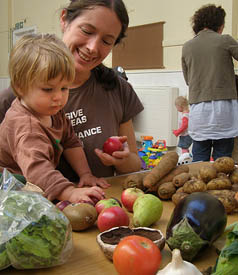What better day than Thanksgiving to celebrate our country’s food rebels!
I’m talking about the growing movement of small farmers, food artisans, local retailers, co-ops, community organizers, restaurateurs, environmentalists, consumers and others — perhaps including you. This movement has spread the rich ideas of sustainability, organic, local control and the Common Good from the fringes of our food economy into the mainstream.
It began in earnest in the 1980s and 1990s as an “upchuck rebellion” — ordinary folks rejecting the industrialized, chemicalized, corporatized and globalized food system. Farmers wanted a more natural connection to the good earth that they were working, just as consumers began demanding edibles that were not saturated with pesticides, injected with antibiotics, ripened with chemicals, dosed with artificial flavorings and otherwise tortured.
These two interests began to find each other and to create an alternative way of thinking about food. Today, more than 13,000 organic farmers produce everything from wheat to meat, and organic food sales top $23 billion a year. Some 4,800 vibrant farmers’ markets operate in practically every city and town across the land, linking farmers and food-makers directly to consumers in a local, supportive economy. Also, restaurants, supermarkets, food wholesalers and school districts are now buying foodstuffs that are produced sustainably and locally.
No one in a position of power — corporate or governmental — made any of these changes happen. Instead, the movement percolated up from the grassroots, and it has become a groundswell as ordinary people inform themselves, organize locally and assert their own democratic values over those of the corporate structure.
Family by family, town by town, this movement has changed not only the market, but also the culture of food. That’s a change worthy of our thanks — and to do it up right, how about having an earth dinner?
Not that you’d eat earth, but that you and others would gather around a table for a social occasion to celebrate the bounty of our good, green earth. Whether you do it for Thanksgiving, Earth Day or just any old day, an earth dinner is a festive opportunity to have friends and family cook, eat and drink together while reveling in the culture of food.
Most of us don’t realize that our dinner tells many stories, embodying our personal histories, family memories, music, art and other connections … besides our tummies. To help reawaken those cultural links in a way that can be tasty, touching and fun, the folks at Organic Valley Family of Farms have come up with the novel idea of earth dinners.
The concept simply involves throwing some sort of dinner party at which the food is not merely consumed, but also is the focus of table talk, reminiscing, singing, laughing, game playing and whatever else you can dream up. It can be a potluck dinner, a buffet, a five-course gourmet meal, a backyard barbeque … whatever suits you. The key is to know something about the food being served — where it comes from, the history of some of the ingredients, songs written about it and so on.
The goal is to get everyone connecting in some personal or cultural way to the dinner as it progresses. Ask guests to tell about their very first food memory, or to recall any family member who was a farmer or a jolly cook. Invite people of diverse backgrounds and all ages. Ask a farm family to join you, or a cheesemaker or others involved in producing food. Then — eat, talk, enjoy!
Organic Valley’s Website offers a sort of earth dinner starter kit, with tips on everything from menus to party favors, as well as providing reports on successful dinners that others have put together. Check it out at www.earthdinner.org — and have a good time!
Copyright 2009 Creators.com
Join us in defending the truth before it’s too late
The future of independent journalism is uncertain, and the consequences of losing it are too grave to ignore. To ensure Truthout remains safe, strong, and free, we need to raise $43,000 in the next 6 days. Every dollar raised goes directly toward the costs of producing news you can trust.
Please give what you can — because by supporting us with a tax-deductible donation, you’re not just preserving a source of news, you’re helping to safeguard what’s left of our democracy.
